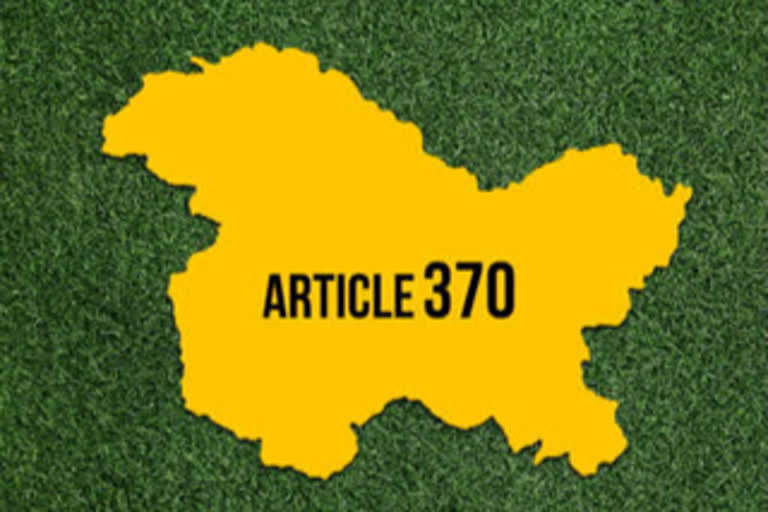New Delhi: The much-desired peace in Jammu and Kashmir (J&K) has been difficult to achieve. The complexities of the issues that often deprive the people of J&K of sustained peace range from external interventions through sponsoring terrorism, demands separation from India to a deep-rooted religious divide. The abrogation of Article 370 in August 2019 which put an end to the special status of the undivided state and bifurcated it into two union territories was perceived by many political elites and the people alike in the J&K as a betrayal by the union government headed by the Bhartiya Janata Party (BJP).
In the last two years following the abrogation of special status, J&K has witnessed the high political drama of the arrests of political leaders opposing the move by the Union Government, and at the same time, the latter has claimed the return of peace. Amidst the allegations by the political leaders from J&K accusing the Union Government of squeezing the spirit of democracy and the counterclaims of re-establishing order, the Prime Minister’s (PM) meeting with political leaders of J&K came as a surprise. The PM’s meeting with the leaders of political parties from J&K on June 24 was unexpected. However, it was perceived as a critical step towards bridging the trust deficit as the home minister claimed the Union Government’s firm commitment to restore full statehood as highlighted by the majority of the leaders of J&K participated in the meeting with the PM.
Also read: Kashmir: Delimitation a thorny issue between NDA govt and regional parties
However, what was observed to be an important step towards bridging the trust deficit between J&K and New Delhi through the meeting has arguably been challenged by a drone attack at the Indian Air Force (IAF) station in Jammu on June 27. The drone attack at the IAF station, the first of its kind in India, has been termed as an act of terrorism by the Director-General of Police (DGP) of J&K, Bilbag Singh. The timing of this ‘terror attack’ merits critical engagement in terms of understanding the difficulties associated with achieving sustained peace in J&K. One of the narratives through which the Central Government attempts to legitimize its move of abrogation of Article 370 and 35A has been the de-escalation of militancy and terrorism-related incidents in J&K. There is an element of truth to the claim made by the Central Government. Contrary to the speculations that the dissolution of special status guaranteed by Article 370 and 35A would lead to escalation of violence and militancy, the sustained efforts by the Central Government have been able to curb them substantially. Following the bifurcation of the state into two union territories, the security forces in J&K have neutralized several militants while a few of them have surrendered to return to the mainstream, which has contributed to the de-escalation of violence and militancy.
Also read: PM Narendra Modi meets with 14 political leaders of J&K
Reduction in violence and militancy levels has been a dominant way of claiming peace by the governments. Going by such an understanding the claims of the Central Government do not seem to be out of place in terms of working towards restoring order and peace in J&K. However, considering the multiple complexities associated, claiming peace is an uphill task for any government at the center. One of such complexities is to take on board or to leave out two critical stakeholders, if not the desired ones, Pakistan, and the separatists.
While taking them on board in any negotiation process is often guided by assertive nationalist and sovereignty-induced hesitancy; excluding them invariably invites troubles in terms of sponsored militancy and terrorism. The terror attack at the IAF station in Jammu by Pakistan, as reported in the media, just three days after the PM meeting with political leaders is a good example. The former Chief Minister of undivided J&K and the People's Democratic Party chief, Mehbooba Mufti, also made a statement highlighting the need for talking to the Kashmiri separatists and Pakistan. While such a statement has not been accepted well (given India’s stated position on J&K, it will never be acceptable in good spirit), it has certainly reiterated the difficulties involved in the pursuit of peace and order in J&K.
The geopolitical developments in India’s neighborhood also need to be factored in this context. The sustained rise of the Taliban as the United States troops withdraw from Afghanistan would have serious implications on the separatists and the militants in terms of reviving their militancy and terrorism against the government. The Taliban’s links with terror outfits like the Laskar-E-Taiba (LeT) and Hizb-ul-Mujahideen (HuM) will have serious implications in terms of the latters’ movements in J&K. The Taliban’s capture of power in Afghanistan, Pakistan’s support to the terrorist groups coupled with a sense of betrayal following the abrogation of Article 370 and 35A would be major hurdles for the ongoing initiatives for the restoration of peace and order in J&K.
As we know achieving peace in the J&K has never been easy as decades-long contestations on multiple issues keep spiraling in newer forms and shades. At this point, as the Central Government has taken a step forward talking to the political leaders there is a need to continue the momentum without any disruption. The restoration of complete statehood, as claimed by the leaders during the meeting with the PM, through a democratic process will contribute immensely in terms of bridging the trust deficit and addressing the grievances. It is only by winning hearts and minds through democratic and dialogical means the efforts towards establishing peace and order in paradise can be achieved.
Also read: Lt Governor calls for new avenues to enhance contribution of forest sector in J-K's economic growth



